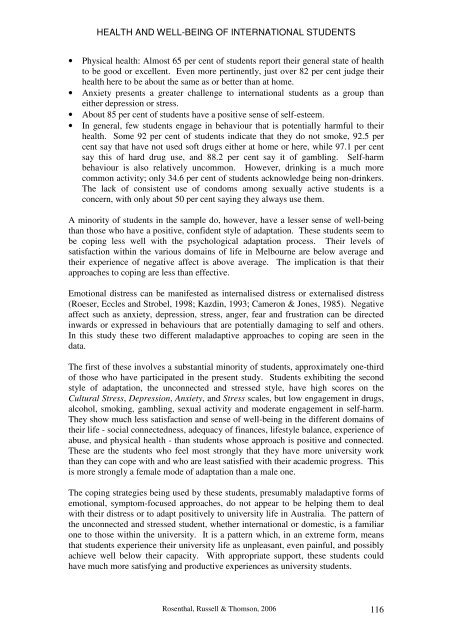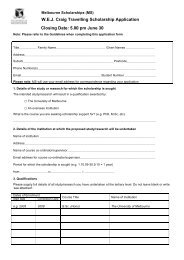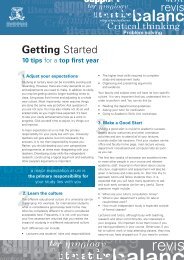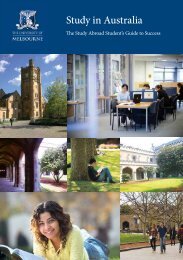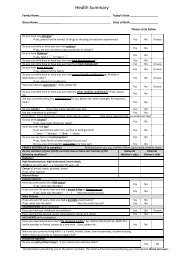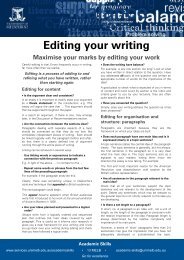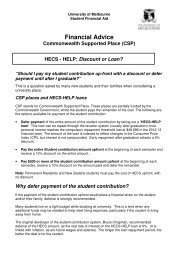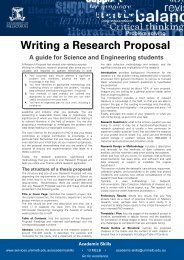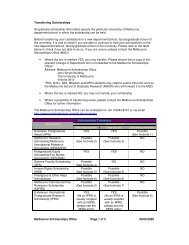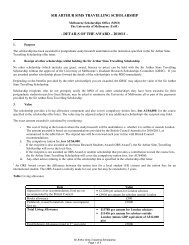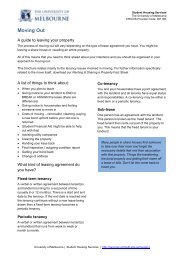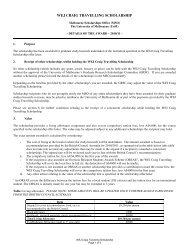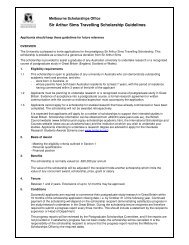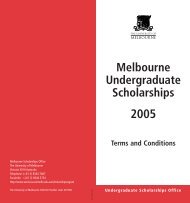a growing experience - Student Services - University of Melbourne
a growing experience - Student Services - University of Melbourne
a growing experience - Student Services - University of Melbourne
Create successful ePaper yourself
Turn your PDF publications into a flip-book with our unique Google optimized e-Paper software.
HEALTH AND WELL-BEING OF INTERNATIONAL STUDENTS• Physical health: Almost 65 per cent <strong>of</strong> students report their general state <strong>of</strong> healthto be good or excellent. Even more pertinently, just over 82 per cent judge theirhealth here to be about the same as or better than at home.• Anxiety presents a greater challenge to international students as a group thaneither depression or stress.• About 85 per cent <strong>of</strong> students have a positive sense <strong>of</strong> self-esteem.• In general, few students engage in behaviour that is potentially harmful to theirhealth. Some 92 per cent <strong>of</strong> students indicate that they do not smoke, 92.5 percent say that have not used s<strong>of</strong>t drugs either at home or here, while 97.1 per centsay this <strong>of</strong> hard drug use, and 88.2 per cent say it <strong>of</strong> gambling. Self-harmbehaviour is also relatively uncommon. However, drinking is a much morecommon activity; only 34.6 per cent <strong>of</strong> students acknowledge being non-drinkers.The lack <strong>of</strong> consistent use <strong>of</strong> condoms among sexually active students is aconcern, with only about 50 per cent saying they always use them.A minority <strong>of</strong> students in the sample do, however, have a lesser sense <strong>of</strong> well-beingthan those who have a positive, confident style <strong>of</strong> adaptation. These students seem tobe coping less well with the psychological adaptation process. Their levels <strong>of</strong>satisfaction within the various domains <strong>of</strong> life in <strong>Melbourne</strong> are below average andtheir <strong>experience</strong> <strong>of</strong> negative affect is above average. The implication is that theirapproaches to coping are less than effective.Emotional distress can be manifested as internalised distress or externalised distress(Roeser, Eccles and Strobel, 1998; Kazdin, 1993; Cameron & Jones, 1985). Negativeaffect such as anxiety, depression, stress, anger, fear and frustration can be directedinwards or expressed in behaviours that are potentially damaging to self and others.In this study these two different maladaptive approaches to coping are seen in thedata.The first <strong>of</strong> these involves a substantial minority <strong>of</strong> students, approximately one-third<strong>of</strong> those who have participated in the present study. <strong>Student</strong>s exhibiting the secondstyle <strong>of</strong> adaptation, the unconnected and stressed style, have high scores on theCultural Stress, Depression, Anxiety, and Stress scales, but low engagement in drugs,alcohol, smoking, gambling, sexual activity and moderate engagement in self-harm.They show much less satisfaction and sense <strong>of</strong> well-being in the different domains <strong>of</strong>their life - social connectedness, adequacy <strong>of</strong> finances, lifestyle balance, <strong>experience</strong> <strong>of</strong>abuse, and physical health - than students whose approach is positive and connected.These are the students who feel most strongly that they have more university workthan they can cope with and who are least satisfied with their academic progress. Thisis more strongly a female mode <strong>of</strong> adaptation than a male one.The coping strategies being used by these students, presumably maladaptive forms <strong>of</strong>emotional, symptom-focused approaches, do not appear to be helping them to dealwith their distress or to adapt positively to university life in Australia. The pattern <strong>of</strong>the unconnected and stressed student, whether international or domestic, is a familiarone to those within the university. It is a pattern which, in an extreme form, meansthat students <strong>experience</strong> their university life as unpleasant, even painful, and possiblyachieve well below their capacity. With appropriate support, these students couldhave much more satisfying and productive <strong>experience</strong>s as university students.Rosenthal, Russell & Thomson, 2006 116


